Now Playing: Lehrer News Hour
Topic: Media Involvement
LEE HOCHBERG: Antiwar protesters have rallied every week in Seattle since the Iraq War began. Largely, they're members of the established peace movement, but lately they've been joined by new demonstrators: Family members of those fighting the war. VICKY MONK, Military Parent: I'm not opposed to war, all war. But what I am opposed to is the irresponsible use of the military, which I believe is what happened in the Iraq war. LEE HOCHBERG: Vicky Monk hopes her son is home soon, after what she says have been 15 harrowing months for him, with the army's 1st Armored Division in Baghdad. She and other military families are lashing out against a war they first believed was against Iraqi weapons of mass destruction, but now say is meaningless.
|
|
| The changing face of the anti-war movement | |
LEE HOCHBERG: The more commonly seen face of military families is like these, at a "Support the Troops" night at a Seattle Mariners baseball game. ("Taps" playing) For them and most military families, supporting the troops has also meant unwavering support for President Bush and the U.S. military mission in Iraq. SPOKESPERSON: He's going to be serving at least 12 months past the time he was supposed to be retired. LEE HOCHBERG: But as U.S. military deaths in Iraq have risen past 1,000 with an end nowhere in sight, some parents and spouses of soldiers have taken public their growing opposition to the war. MOTHER: My son was in the army. He was killed Feb. 3 of this year. REPORTER: How? MOTHER: How? You tell me -- LEE HOCHBERG: This mother, whose son was killed in Iraq, protested last month at a New Jersey campaign appearance of First Lady Laura Bush.
LEE HOCHBERG: She challenged the first lady's assertions that the war is going well. She was handcuffed and arrested for trespassing. MOTHER: Excuse me! What are you charging me with? Excuse me! LEE HOCHBERG: Other families have lain memorials for fallen relatives outside the White House fence in somber protest. Such resistance from military families didn't happen in previous wars, according to historian Michael Beschloss. MICHAEL BESCHLOSS: We're seeing something that really is unusual because military families in history have been pretty much inclined not to do this sort of thing. It's in a way sort of part of that culture. And the fact that they are doing it now shows how deeply many of them feel about the fact that they were never convinced at the beginning of this war that it was the right thing to do. NANCY LESSIN, Military Parent: It was our loved ones who were going to go, and we felt that, in fact, they were going to be used as cannon fodder. LEE HOCHBERG: Sixteen hundred military families have joined under the banner of "Military Families Speak Out." The group was founded by Nancy Lessin and Charley Richardson of Boston. Their son, Joe, a marine, was deployed to Iraq in what the pair saw as a war for oil. Lessin's group attracted other families when she used the Internet to call for a full troop withdrawal. Thirty of the members have lost loved ones. Others were worried about extended deployments, inadequate equipment and post-traumatic stress disorder. All had been afraid to go public.
CHARLEY RICHARDSON, Military Families Speak Out: The people who made the decision to take us into this war aren't giving up their loved ones to this war. We are, and our voices are important. |  |
| Dealing with and countering the criticism | |
LEE HOCHBERG: Their message has resonated among some families with longtime military backgrounds. In rural South Bend, Washington, lay pastor Lietta Ruger used her church pulpit to assail President Bush for misleading America. LIETTA RUGER, Military Family: I am a military family. We are a military family. I speak out in support of the troops, by bringing them home and ending this war that we know is a product of lies. LEE HOCHBERG: Ruger's son-in-law and nephew are in the 1st Armored Division in Baghdad. Her husband, Arthur, and her father, were in the Air Force.
LEE HOCHBERG: The Rugers say their son-in-law doesn't object to their criticism of the war. He shared his thoughts with us by phone, requesting we shield his identity. SON-IN-LAW: To go to war on the basis that we went to war on, I don't agree with that. And then to get lied to by the president. We know people are speaking out against the war, not against us. We're not dumb. We know. LIETTA RUGER: He said, "Mom, it's wrong here. We're not doing anything. We're hurting, we're harming." LEE HOCHBERG: Despite her son-in- law's support, Ruger's extended military family has been furious with her stand, and she has been severely criticized over the Internet. Family life also has been difficult for Stacy Bannerman, whose husband left Seattle for Iraq with his National Guard unit in February. Bannerman's life work has been with peace organizations and she has publicly opposed the war from its start. STACY BANNERMAN: We should be crying about this. We should be. This country should be. LEE HOCHBERG: But her husband embraces his mission. One evening last month, as she attended a Seattle-area meeting of Military Families Speak Out, he telephoned from Baghdad.
|  |
| Does protesting the war hurt the troops? | |
LEE HOCHBERG: Some answer that all of the antiwar military families are guilty of betrayal. Outside the church in rural South Bend, Thelma Crawford was critical of Lietta Ruger's antiwar sermon. THELMA CRAWFORD: You know as well as I that there's terrorists that's living all around us, and all they've got to do is just get a little support and a little momentum and, bing, we're gone. LEE HOCHBERG: And at a recent "Support the Troops" demonstration outside Seattle, some said even if Saddam possessed no weapons of mass destruction, his removal itself justifies the war. They say military families speaking out undercut the U.S. mission there. Robert Snyder was in the army during the Vietnam era. ROBERT SNYDER, Veteran: If my family didn't even support me during the 15 years that I was active duty, do you think that would be wrong? That would be wrong. That would hurt me emotionally. LEE HOCHBERG: Nadine Gulit agrees.
NADINE GULIT: When the protesters and the people spoke out against, it's demoralizing and it is a form of treason. Yes, the enemy does use it. They will use it. It builds up their morale. LEE HOCHBERG: But military families opposed to the war say they are every bit as patriotic as those who support it. They traveled to the nation's capital this weekend to talk to members of Congress and staged a very public demonstration, carrying caskets from Arlington National Cemetery to the White House. | |






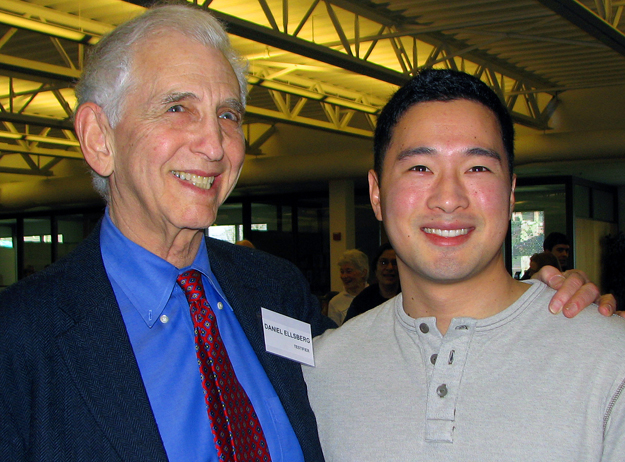
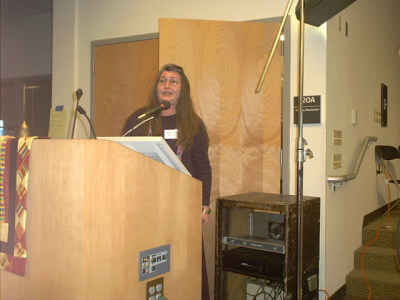
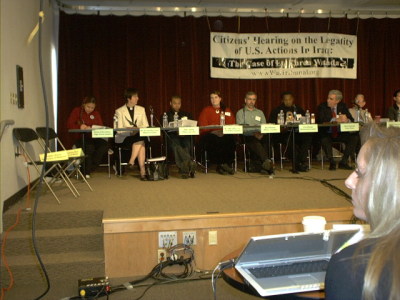 (photo - on the Panel - Elizabeth Falzone - GSFSO/ MFSO - WA chapter and Rich Moniak - MFSO - Alaska chapter listen to two days of testimony)
(photo - on the Panel - Elizabeth Falzone - GSFSO/ MFSO - WA chapter and Rich Moniak - MFSO - Alaska chapter listen to two days of testimony)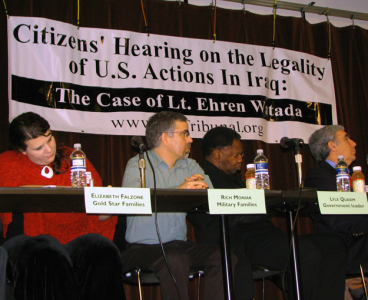
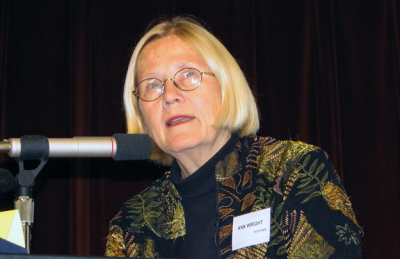
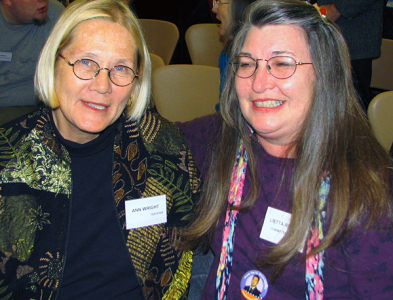
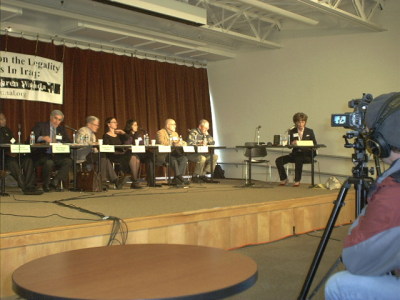 (photo - Stacy Bannerma, wife of returning Iraq veteran - WA Natl Guard, gives testimony)
(photo - Stacy Bannerma, wife of returning Iraq veteran - WA Natl Guard, gives testimony)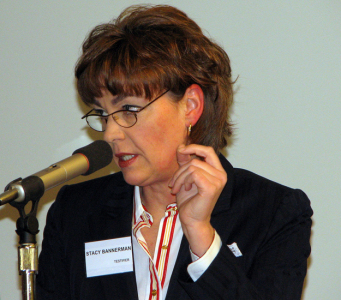
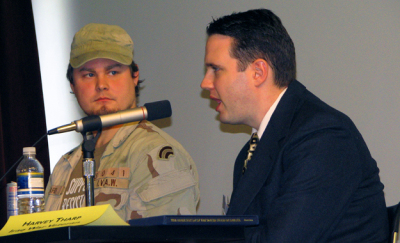
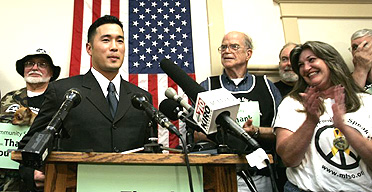 (photo Lietta Ruger, MFSO- WA, in support Lt. Ehren Watada, June 2006, Tacoma, WA)
(photo Lietta Ruger, MFSO- WA, in support Lt. Ehren Watada, June 2006, Tacoma, WA)
 (photo - Lietta Ruger, Judy Linehan, Jenny Keesey - from MFSO - WA chapter, June 2006, Tacoma, WA)
(photo - Lietta Ruger, Judy Linehan, Jenny Keesey - from MFSO - WA chapter, June 2006, Tacoma, WA) (photo - Judy Linehan, MFSO - WA at support rally for Lt. Watada, June 2006, Tacoma, WA)
(photo - Judy Linehan, MFSO - WA at support rally for Lt. Watada, June 2006, Tacoma, WA)





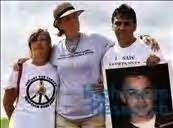
 photo - Sue Niederer, MFSO. Her son U.S. Army 2nd Lt.Seth Dvorin, 24 yrs old was killed in Iraq Feb 3, 2004.
photo - Sue Niederer, MFSO. Her son U.S. Army 2nd Lt.Seth Dvorin, 24 yrs old was killed in Iraq Feb 3, 2004. photo - Nancy Lessin, MFSO Co-Founder
photo - Nancy Lessin, MFSO Co-Founder  photo - Lietta Ruger, MFSO - WA
photo - Lietta Ruger, MFSO - WA  photo - Stacy Bannerman, MFSO - WA
photo - Stacy Bannerman, MFSO - WA


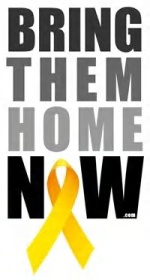
 VICKY MONK: When the army itself admitted they were unable to find the weapons of mass destruction, my son began to question, "Why am I here? Why do I have to continue to be here?" So, I feel a certain amount of responsibility, as his mother, to stand up and say, Why did you send my son to war? Why did you put my son in harm's way?
VICKY MONK: When the army itself admitted they were unable to find the weapons of mass destruction, my son began to question, "Why am I here? Why do I have to continue to be here?" So, I feel a certain amount of responsibility, as his mother, to stand up and say, Why did you send my son to war? Why did you put my son in harm's way? 
 NADINE GULIT, Military Family: You cannot support the troops without supporting the mission that they are on.
NADINE GULIT, Military Family: You cannot support the troops without supporting the mission that they are on. 